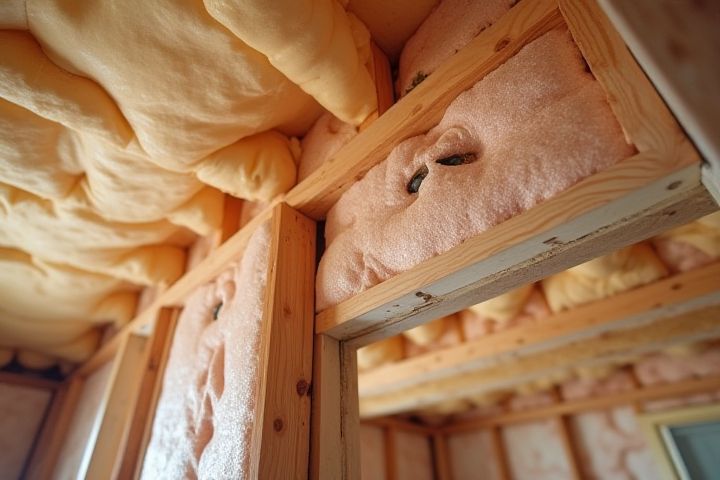
Good insulation is essential for maintaining a comfortable indoor temperature, reducing energy costs, and enhancing the overall efficiency of your home. It acts as a barrier against heat loss during winter and keeps cool air inside during summer, ensuring a stable climate throughout the year. High-quality insulation materials, such as fiberglass, foam, or cellulose, can significantly lower your heating and cooling bills by minimizing energy consumption. Furthermore, proper insulation helps prevent moisture buildup, reducing the risk of mold and improving air quality. Investing in effective insulation enhances your home's value and contributes to a more sustainable living environment.
Why Does A House Need Good Insulation
Energy efficiency improvement
Good insulation in a house significantly boosts energy efficiency by minimizing heat loss in winter and heat gain in summer. Proper insulation can reduce your heating and cooling costs by up to 30%, translating to substantial savings on energy bills over time. Furthermore, energy-efficient insulation materials, such as spray foam and cellulose, have high R-values, indicating superior thermal resistance. Improved insulation not only enhances comfort levels within your home but also contributes to a reduced carbon footprint by lowering overall energy consumption.
Cost savings on energy bills
Good insulation in a house significantly reduces energy consumption, leading to substantial cost savings on energy bills. Insulated homes maintain consistent indoor temperatures, minimizing the workload on heating and cooling systems, which can account for up to 50% of your energy expenses. By investing in quality insulation, homeowners can save an estimated 20% to 30% on heating and cooling costs annually. This not only lowers utility bills but also enhances the overall comfort and efficiency of your living space.
Enhanced indoor comfort
Good insulation significantly enhances indoor comfort by maintaining a stable temperature throughout your home. Properly insulated walls, attics, and floors prevent drafts and limit heat loss during colder months, ensuring that your living spaces remain warm and cozy. In the summer, quality insulation helps keep the heat outside, allowing for a cooler interior environment without excessive reliance on air conditioning. Investing in effective insulation not only contributes to a more pleasant living experience but also reduces energy consumption and lowers utility bills.
Temperature regulation
Good insulation is essential for maintaining consistent temperature regulation within a house, impacting both comfort and energy efficiency. With effective insulation, homes can reduce heat loss in winter by up to 40% and minimize heat gain in summer, leading to lower energy bills. It creates a stable indoor environment, allowing your heating and cooling systems to work more efficiently and requiring less energy to maintain the desired temperature. This not only enhances comfort but also contributes to a lower carbon footprint, aligning with sustainable living practices.
Noise reduction
Good insulation significantly contributes to noise reduction within a house, creating a more serene living environment. By effectively absorbing sound waves, high-quality insulation materials prevent external noises, such as traffic or construction, from penetrating your home. This soundproofing aspect enhances comfort and privacy, allowing you to enjoy peace in your personal space. Investing in proper insulation not only elevates your home's tranquility but also positively impacts your overall well-being.
Reduced carbon footprint
Good insulation significantly reduces your home's carbon footprint by minimizing heat loss in winter and heat gain in summer, which lowers the energy required for heating and cooling. According to the U.S. Department of Energy, effective insulation can reduce energy bills by up to 30%, demonstrating its impact on energy consumption. Installing high-quality insulation materials, such as spray foam or cellulose, can keep your home comfortable while decreasing greenhouse gas emissions associated with heating systems. By investing in proper insulation, you contribute to a more sustainable environment and enhance your home's energy efficiency.
Moisture control
Good insulation is essential for a house as it plays a crucial role in moisture control, preventing the buildup of excess humidity and reducing the risk of mold growth. When insulation is properly installed, it creates a barrier that minimizes temperature fluctuations, which can lead to condensation inside walls and ceilings. This condensation can damage structural materials and promote unhealthy living conditions, impacting indoor air quality. By ensuring effective insulation, you protect your home from moisture-related issues, enhancing comfort and longevity.
Prevention of drafts
Good insulation in a house is essential for preventing drafts, which can significantly impact comfort and energy efficiency. Properly insulated walls, ceilings, and floors reduce the risk of air leaks, allowing temperatures to remain stable and reducing the need for excessive heating or cooling. According to the U.S. Department of Energy, proper insulation can lead to energy savings of up to 20% on heating and cooling bills. Ensuring your home has effective insulation not only improves indoor air quality but also enhances the overall lifespan of your heating and cooling systems by preventing unnecessary strain.
Increased property value
Good insulation significantly enhances a house's energy efficiency, leading to reduced utility bills that appeal to potential buyers. A well-insulated home maintains consistent indoor temperatures, making it more comfortable and inviting, which can increase demand in the real estate market. This energy-efficient characteristic often translates to higher resale values, as buyers prioritize long-term savings and eco-friendly living. Investing in quality insulation not only improves your living environment but also serves as a lucrative enhancement to your property's overall worth.
Prolonged HVAC system lifespan
Good insulation significantly enhances your home's energy efficiency, which directly contributes to the prolonged lifespan of your HVAC system. When properly insulated, your home maintains a consistent temperature, reducing the workload on heating and cooling systems by up to 30%. This decreased demand lessens wear and tear, potentially extending the lifespan of your HVAC unit beyond the average 15-20 years. By minimizing energy loss, you not only save on utility bills but also ensure that your HVAC system operates optimally for years to come.
